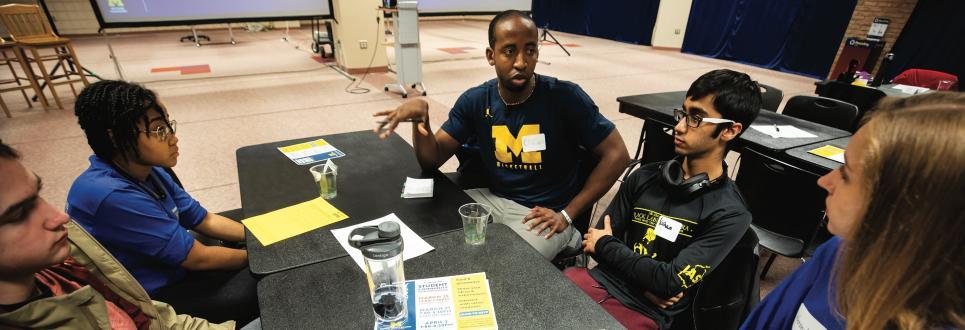Faculty & Staff Resources


Military-Connected Students bring unique and valuable perspectives to their university experience. Military-connected students are a valued and vital component of our campus community. We recognize and honor their sacrifices and value their life experiences as they broaden the diversity of our student body.
As with any identity group, military-connected students bring their own set of experiences, gifts, challenges and expectations to our diverse student body. Learning about their experiences and adapting techniques in the classroom and in campus programming and services helps these students succeed.
As a part of this process the Veteran and Military Services Program was established in 2008. Housed in the New Student Programs (a part of Enrollment Management), the program offers several programming and support structures for military-connected students.
We invite faculty and staff who have served in the military to connect with student veterans via our programs. Your experience and knowledge of U-M combined with your understanding of the military experience places you in a position to offer guidance and advice to students who are making the transition from the military to campus life. For faculty and staff who have not served in the military we ask you to participate in an online or face-to-face training module.
The Veteran and Military Services Program is overseen by the VMS program director, Philip Larson, who works closely with current student veterans. Our office will assist in planning social and information programs students.
As world events unfold, our military-connected students may be called away from campus on short notice for short term training or longer sustained military deployments.
We know that military service, whether it is active-duty, National Guard, or reserves can be stressful, challenging, and sometimes cause interruptions or delays in students' academic lives. We encourage all faculty and staff at the University of Michigan, Ann Arbor campus, to have the greatest leniency possible when assisting students who are facing military obligations.
When any academic disruption occurs, we encourage our students to talk with their academic faculty, units and advisors to develop a collaborative plan that will be best for their academic and personal well-being. Often students who are called to active service in the military must plan, on short notice, for things such as childcare, ongoing financial obligations, housing, and healthcare. Anything we can do as a university to help make the academic planning less stressful for the student is highly encouraged.
Whenever possible, students should be allowed to choose among these options:
OR
We encourage you to visit the Active Duty & Deployment page for more information if you know a student is facing military activation or mobilization.
We also must follow federal law when it comes to military service and higher education. Specifically, title 20 of the United States Code, section 1091c (20 U.S.C. 1091c) specifies that students who must be absent from an institution of higher education due to military service for more than thirty consecutive days are generally entitled to readmission, provided that they give advance notice (where possible) of their absence to the institution, have not been absent for more than five years (cumulative of any prior absences for military service), and submit an intent to reenroll at the institution of higher education.
The institution generally must readmit a service member with the same academic status upon return from activation or mobilization. Federal regulations clarify that this means that an institution must do the following:
The regulations recognize, however, that there may be situations where the institution determines that, even after reasonable efforts by the institution, the student is not prepared to resume the program or is not able to complete it. In such a case, the institution would not be required to readmit the student. The institution bears the burden of demonstrating, by a preponderance of the evidence, a student's inability to resume or complete the prior program.
The regulations also set limits on the tuition and fees that may be charged when the student returns to the institution after military service.
Relevant laws and regulations:
Servicemembers Civil Relief Act of 2003
Federal Law protecting deployed, mobilized, or activated students
If you have detailed questions please contact Phil Larson, Program Director of Veteran and Military Services, at [email protected].
Faculty and staff at U-M are invited to workshops and training to help them best serve military-connected students.
We invite faculty and staff working at the University of Michigan to participate in online and/or scheduling face-to-face training with our staff. After completion of one of the training modules, listed below, you can request our “Military-Connected Student Friendly” card to proudly display on your office wall, window or door to signify you have received training about military-connected students.
Video and 10-15 minute intro for meetings
Module 1 consists of the Veteran and Military Services Coordinator, Philip Larson, to come to a meeting or your work site and give a 10-15 minute overview of Military Connected Student concerns. This would feature the 7 minute video (above) plus observations and handouts from Philip. He would be available for additional Q&A time if requested.
Military-Connected Student Panel
Module 2 will consist of a panel of military-connected students. To have adequate time, please plan on an hour session. This training will consist of 40 minutes of prepared questions plus an additional 10-20 minutes of participant questions and answers.
If you have a request (ex: undergraduate only, LSA students only, dependents etc.) please indicate in the “Special Request” section of the form.
Faculty and Staff Workshop
Using research and personal interactions, Philip Larson will discuss the benefits of military-connected students at the University of Michigan, talk about common myths and stereotypes that military-connected students face, discuss strategies for student veteran and military-connected student success and talk about military-connected students and DEI initiatives – specifically the intersection of military-connected identities and those of other groups.
1 to 2 hour workshop for faculty and staff